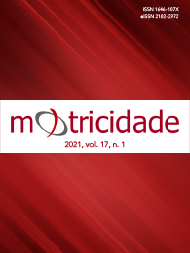Effects of weekly hippotherapy frequency on gross motor function and functional performance of children with cerebral palsy: a randomized controlled trial
DOI:
https://doi.org/10.6063/motricidade.23847Abstract
Objective: To verify whether hippotherapy once or twice a week has a different effect on gross motor function and functional performance in children with cerebral palsy. Methods: This trial had 20 children (age 2 to 5 years and 11 months) with cerebral palsy who were assigned to the groups once a week (n = 9) or twice a week (n = 11) and underwent 30-minute hippotherapy sessions for 16 weeks. The instruments used were the Gross Motor Function Measure (GMFM) and the Pediatric Evaluation of Disability Inventory (PEDI), assessed at baseline and after 16 weeks. Results: A significant time effect was observed for both groups without significant interactions between groups. Conclusions: Hippotherapy improved the gross motor function and functional performance of children with cerebral palsy, regardless of the weekly frequency of the sessions. This result has relevant clinical implications, since hippotherapy has a high cost and the prescription of weekly sessions could make this treatment more available for this population.
Key-words: Equine-assisted therapy, Cerebral Palsy, Heavy Motor Function, Functional Performance
Downloads
Published
Issue
Section
License
The authors of submitted manuscripts must transfer the full copyright to Journal Motricidade / Sílabas Didáticas Editions. Granting copyright permission allows the publication and dissemination of the article in printed or electronic formats, and copyrights start at the moment the manuscript is accepted for publication. It also allows Journal Motricidade to use and commercialise the article in terms of licensing, lending or selling its content to indexation/abstracts databases and other entities.
According to the terms of the Creative Commons licence, authors may reproduce a reasonable number of copies for personal or professional purposes, but without any economic gain. SHERPA/RoMEO allows authors to post a final digital copy (post-printing version) of the article on their websites or on their institutions' scientific repository.


